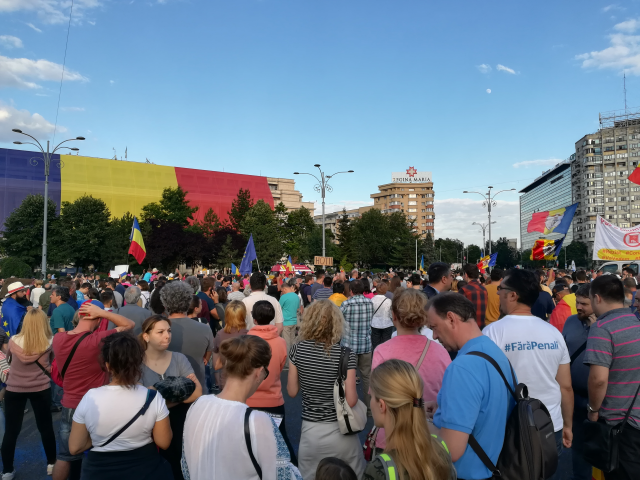Rebuilding a Culture of Protest in Romania
Next to universal suffrage, protests are the ultimate manifestation of free expression in modern society

Steliu Lambru, 07.10.2019, 14:01
Next to universal suffrage, protests are the ultimate manifestation of free expression in modern society. The roots of protests are in the French Revolution of the 18th century. Protests have always been a measure of freedom in a modern society. 20th century tyrants have had a pathological aversion of protests, which contested their authority. This aversion was inherited by the non-liberal and populist leaders of the present period, one that fortunately did not lead to a disappearance of protests, which happened under Fascist and Communist regimes.
In interwar Romania, protests were a common way of expressing disagreement between a social or political group and the authorities. Starting in 1945, however, when the Communist regime started being imposed, protests started being repressed brutally. However, even between 1945 and 1989, Romanians went on protests when living and working conditions became unbearable. Such protests were the strikes of the miners in 1977 and the strikes of workers at the Red Flag and Tractor heavy machinery factories in Brasov. In 1989, in a sort of historical revenge, Romanians won back their right to protest by massive protests that led to the fall of the regime. Since then, recent Romanian history may be written by following the trail of protests.
Poet Ana Blandiana, an opponent of the Communist regime, and one of the people who made an important contribution to the rebirth of protest in Romania, recently inaugurated an exhibition with the name Democracy and Protest. Blandiana said that the purpose was to restore the memory of the moments that have marked the rebirth of the spirit of protest:
“This idea, which is not original, contains certain highlights particular to the present. We wanted to gather together and line up as if on a string the great protests that have taken place in Romania, starting in 1945, with the first protests against the emerging Communist regime, and ending with the Victory Square protests of early 2017. We are speaking of a time bracket of over half a century, with 30 years of freedom and 45 years of dictatorship. It is a plea to build a culture of protest. A true civilization has a culture of protest, and a culture of protest means tying together various protests along the years.”
The Rosia Montana protests were talked about with a great deal of naiveté, and that was because they were the first real protests in the modern history of Romania. That amazed me, because half of the protesters in Piata Victoriei were the ones that had protested in University Square 20 years before. The people who took to the street in 2017 simply didnt know that, because we are living in a society that systematically destroys memory. It was not about ill will, it was something to worry about the future of generations that wanted to break away with what had been before them.”
The existence of protest does not mean that it is always beneficial to democracy. Here is Ana Blandiana once again:
“I got from the US an essay called The Language of Protest. It has on the cover the famous anarchy symbol, the circle. I had a revelation reading it, regarding the difference between forms of protest. For the American who wrote the book, protest was a way to challenge society. Anarchy wants to destroy society without having much to say about what it wants to put in place of it. The protests we thought about were in favor of the rule of law, in support of it. Back in 1945 it was under threat, and was about to be destroyed, but people wanted it. What else were the 1987 protests in Brasov for anyway? These were barely adult people who represented the workers in Brasov. After that, the decade of the Civic Alliance was a plea, and a protests against the refusal to build rule of law based on the Timisoara Proclamation. The 2017 protests are simply protests by people who wont accept the fact that Romania is incapable of having rule of law.”
The culture of protest has become second nature for Romanians after 50 years of repression. The 1990s were dominated by a wide variety of protests, from constructive peaceful protest to violent extreme forms. Political protest held headlines in newspapers and on television and radio news bulletins for year. The marathon protest lasting 52 days in University Square in April-May of 1990 remains the highlight for people who believe that it is paramount to say no when they feel that politicians dont lead society on a path towards the common good. It can be said that the rebirth of protest in Romania after 1989 was tied to a rebirth of democracy and a form of politics in which people strive for the common good.





























